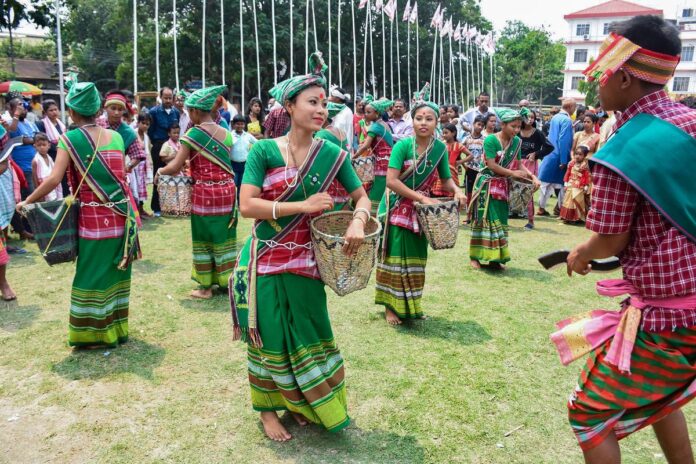In a major step towards preserving and promoting the rich cultural heritage of Assam, eight products of the Bodo tribe, including the iconic ‘Aronai’, have secured Geographical Indication (GI) tags. This development not only acknowledges the unique craftsmanship of the Bodo community but also provides a boost to the local economy by safeguarding these products’ authenticity on a global platform.
The Bodo tribe, one of the largest indigenous groups in Northeast India, has a rich tradition of weaving and handicrafts. The GI tag will protect the intellectual property rights of these products, preventing unauthorized use and imitation, while also promoting the Bodo culture and heritage globally.
What is a Geographical Indication (GI) Tag?
A Geographical Indication (GI) tag is a certification provided to products that have a specific geographical origin and possess qualities or a reputation that are due to that origin. This certification ensures that only products produced in a specific region can be marketed using that name, thereby protecting the authenticity and traditional knowledge associated with the product.
For the Bodo tribe, receiving GI tags for these eight products is a recognition of their centuries-old craftsmanship, which has been passed down through generations. This certification not only adds economic value but also helps preserve the traditional techniques and cultural practices unique to the Bodo community.
The Eight Bodo Products That Secured GI Tags
The eight products from the Bodo community that have been awarded GI tags include:
- Aronai: The most iconic product of the Bodo tribe, Aronai is a traditional scarf or shawl that is an integral part of Bodo culture. It is worn during important ceremonies, festivals, and even as a daily accessory. Made from high-quality silk or cotton, the intricate weaving patterns and vibrant colors of Aronai symbolize the identity and pride of the Bodo people.
- Dokhona: A traditional attire worn by Bodo women, Dokhona is a long wrap-around dress made from woven silk or cotton. It is often adorned with colorful patterns and is considered an essential part of Bodo cultural festivals and ceremonies.
- Gamsa: A handwoven fabric used as a towel or wrap, Gamsa is a versatile product that reflects the Bodo tribe’s skilled weaving techniques. Known for its durability and fine craftsmanship, it is often used in everyday life and during cultural rituals.
- Bodo Mekhela: Mekhela, another traditional attire for women, consists of two pieces of cloth draped around the body. The Bodo version of Mekhela is known for its unique designs, rich fabric, and vibrant colors, making it a staple in Bodo women’s wardrobes during cultural celebrations.
- Jwmgra (Traditional Shawl): This traditional shawl is another product of Bodo weaving craftsmanship, often made from cotton or silk and used during formal and cultural events.
- Silk Shawls: Bodo silk shawls are renowned for their softness and intricate patterns. These shawls are often made from Assam silk, a high-quality material, and are worn on special occasions.
- Endi Shawls: Endi, or eri silk, is produced in Assam and is known for its eco-friendly production process. Bodo artisans weave this silk into beautiful shawls that are highly sought after for their warmth and comfort.
- Bodo Handloom Textiles: This includes a variety of fabrics woven by the Bodo community, showcasing their rich tradition of handloom weaving. These textiles are used to create traditional attire, accessories, and home décor items.
Cultural and Economic Impact of GI Tags
The GI tagging of these eight products is a momentous achievement for the Bodo community and the state of Assam. It not only provides legal protection to the products but also elevates the status of traditional Bodo crafts on the global stage. With this recognition, these products can now be marketed more effectively, both in India and internationally, which will boost tourism and economic opportunities for local artisans.
The Bodo tribe has long been recognized for their skilled weaving techniques, which are deeply embedded in their cultural identity. The GI tag helps in preserving these traditional crafts, encouraging younger generations to continue the legacy of their ancestors.
Boost to Assam’s Handloom and Handicraft Industry
The handloom and handicraft industry in Assam is a significant contributor to the state’s economy, employing thousands of artisans, particularly women. With the GI tagging of these products, the Bodo tribe’s artisans can now sell their crafts at premium prices, increasing their income and improving their livelihood. This recognition also opens doors for export opportunities, enabling these products to reach a broader audience worldwide.
The GI tags will also promote sustainable tourism in the region, as visitors are likely to be drawn to the rich cultural heritage and unique crafts of the Bodo tribe. Tourists who visit Assam for its natural beauty and wildlife will now have an added reason to explore the traditional Bodo textiles and handicrafts, further boosting the local economy.
While the GI tags are a significant achievement, there are challenges in ensuring that the benefits reach the artisans at the grassroots level. Efforts must be made to establish strong supply chains, promote these products in international markets, and provide artisans with the necessary training to maintain quality standards.
The government, along with local organizations, must work together to create marketing platforms and digital avenues for promoting these products globally. E-commerce platforms and artisanal fairs can be valuable tools in reaching a broader audience and ensuring that the GI-tagged products achieve their full potential.
The GI tagging of eight traditional products from the Bodo tribe of Assam, including the beloved Aronai, is a proud moment for the community and the entire state. It is a testament to the rich cultural heritage of the Bodo people and their contribution to India’s vibrant handloom and handicraft traditions. As these products gain international recognition, they will not only boost the local economy but also serve as symbols of pride and identity for the Bodo community.




